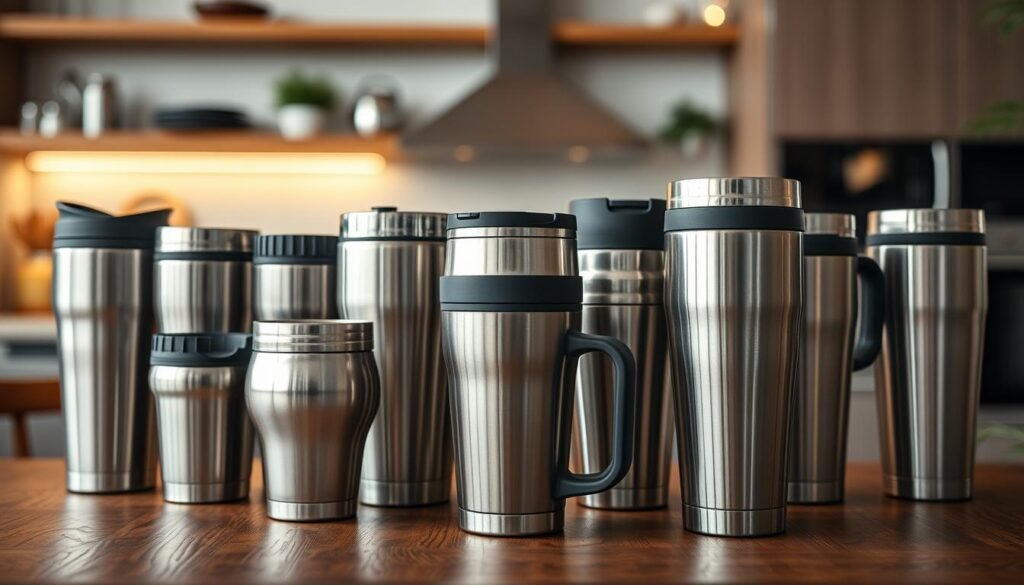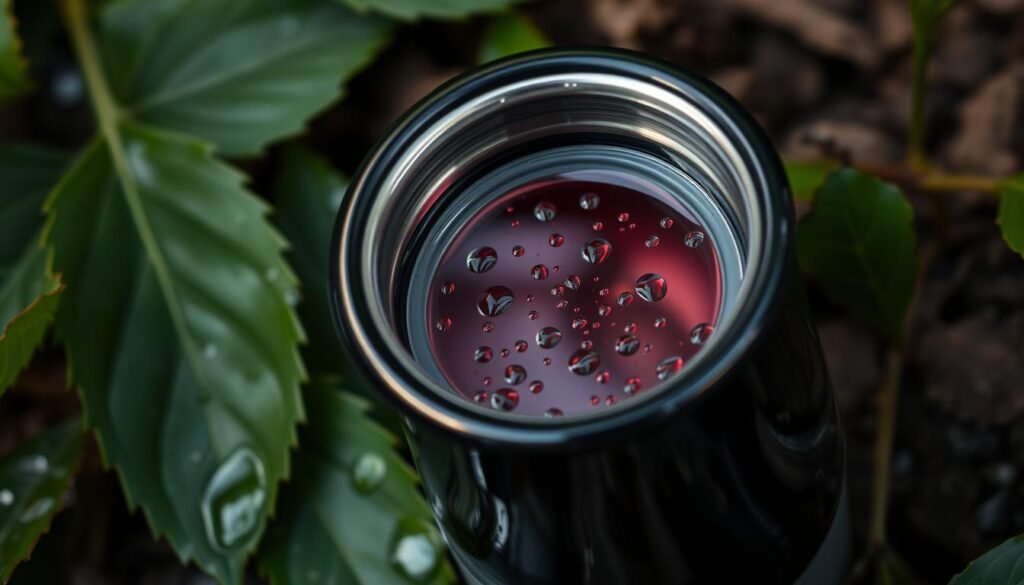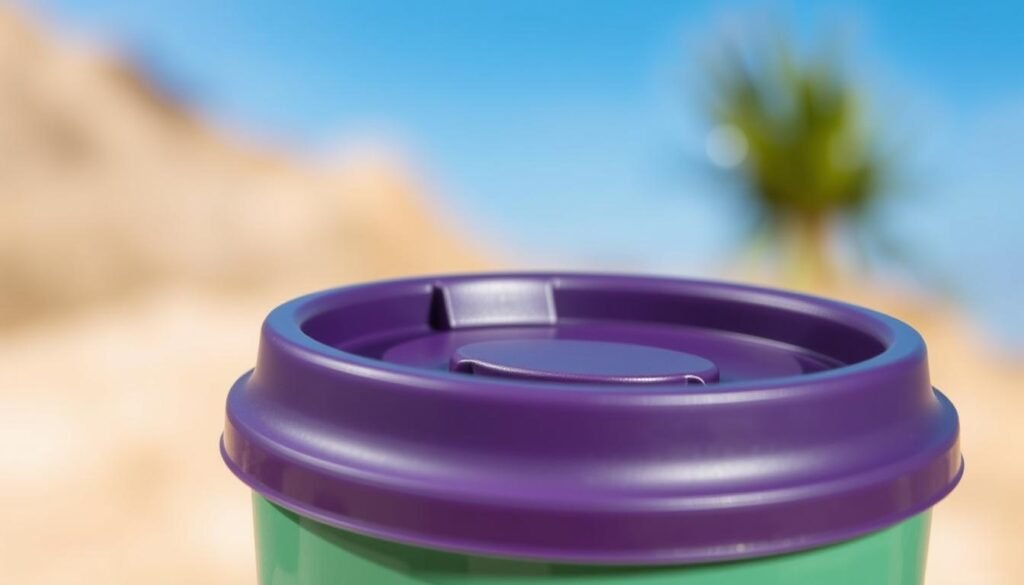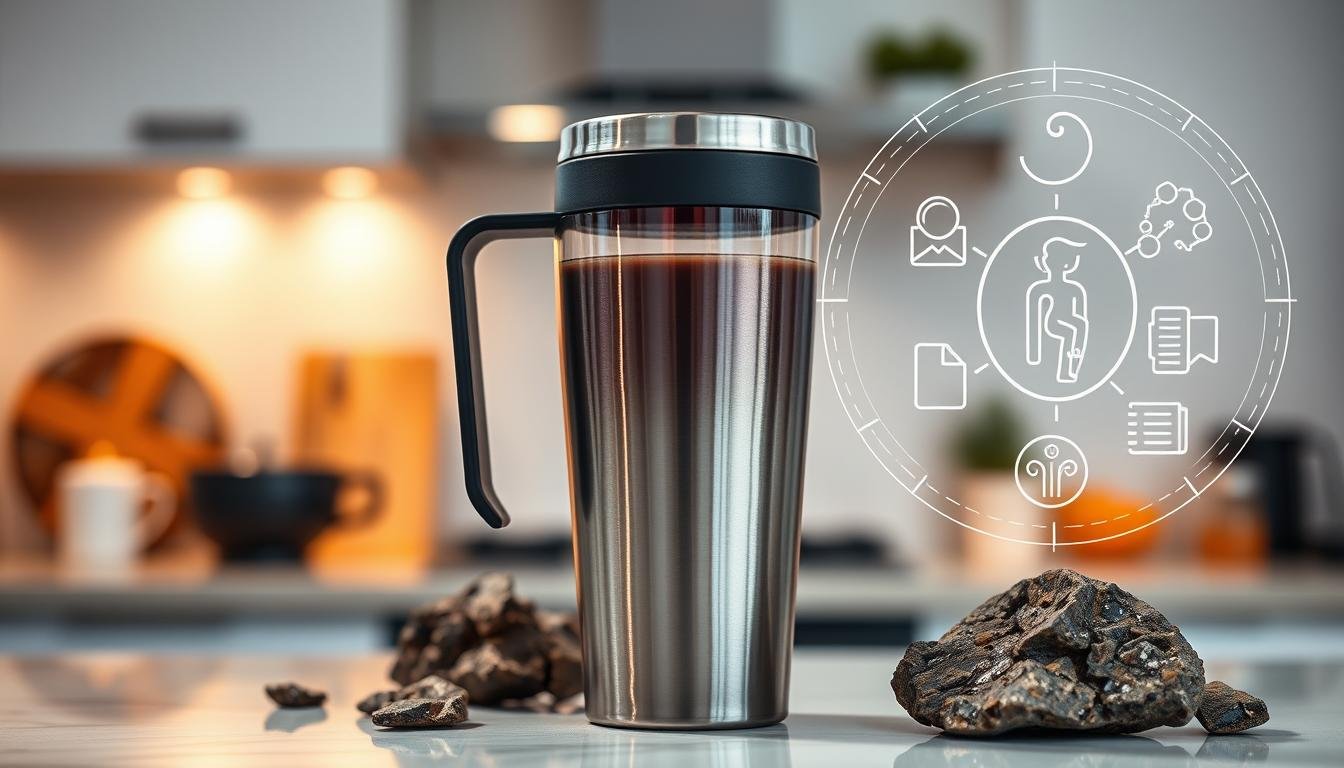Travel mugs are now a must-have for many. They keep our drinks hot or cold, making our daily commute better. But, there’s a worry about the materials used, especially manganese. If you’re wondering are travel mugs with manganese on them safe, it’s essential to understand the implications. Manganese is found in many products, including travel mugs.
Understanding manganese and its effects is key. We need to know how it’s used in making products and its health risks. This knowledge will help us determine are travel mugs with manganese on them safe for everyday use. By examining the role of manganese in manufacturing and potential health impacts, we can make informed decisions about the safety of using such travel mugs.
Key Takeaways
- Too much manganese can be harmful to our health.
- We usually get manganese from food and water.
- Travel mugs with manganese coatings might increase our manganese intake.
- Long-term manganese intake can cause health problems like Parkinson’s disease.
- Good manufacturers follow strict safety rules to protect us.
Table of Contents
Introduction to Travel Mugs and Material Safety
Travel mugs are a big part of our daily lives. They let us enjoy our drinks on the go. It’s important to know the materials they’re made of are safe and of good quality.
Convenience and Portability of Travel Mugs
Travel mugs are handy for staying hydrated or enjoying a drink while moving. They let us carry our favorite drinks with us. This helps us live more sustainably by using fewer disposable cups.
Importance of Material Safety in Consumer Products
Material safety is key for products that touch our food and drinks. The Food and Drug Administration (FDA) in the U.S. sets rules for these products. They decide what materials are safe and what chemicals are okay.
Regulatory Guidelines for Food and Beverage Containers
Companies making travel mugs and other containers must follow FDA rules. These rules make sure the materials are safe for us. They’re especially important for containers used with hot or acidic drinks.
“Ensuring the safety of materials used in consumer products like travel mugs is essential for protecting the health and well-being of the public.”
Understanding Manganese
Manganese is a chemical element with the symbol Mn and atomic number 25. It’s key in making stainless steel and aluminum alloys. In travel mugs, manganese makes them stronger and more durable.
Explanation of Manganese and Its Typical Use in Manufacturing
Manganese is a hard, gray-white metal. It’s vital for the steel industry. It makes steel stronger, harder, and more resistant to corrosion.
The manganese element is also in aluminum alloys, dry-cell batteries, and chemical compounds. In travel mugs, manganese in manufacturing makes the stainless steel stronger. This makes the mug last longer. But, some worry about health risks from manganese in mugs.
| Characteristic | 304 Stainless Steel | 201 Stainless Steel |
|---|---|---|
| Corrosion Resistance | Better | Poorer |
| Stampability | Better | Poorer |
| Price | Higher | Lower |
| Ductility | Better | Poorer |
| Fatigue Resistance | Better | Poorer |
| Likelihood of Rusting | Lower | Higher |
Health Implications of Manganese Exposure
Manganese is a trace mineral important for health. But too much can cause serious problems. It’s found in many foods and helps our bodies work right. Yet, too much can harm our nervous system and brain.
Too much manganese can make people feel like they have Parkinson’s disease. This includes shaking, trouble walking, and muscle spasms in the face. It happens because manganese builds up in the brain, affecting how we move and balance.
Also, manganese can hurt how well kids think and learn. High levels can make it hard for them to remember things, focus, and solve problems.
| Potential Health Effects of Manganese Exposure | Impact on Nervous System | Impact on Cognitive Function |
|---|---|---|
| Tremors | ✓ | |
| Difficulty Walking | ✓ | |
| Facial Muscle Spasms | ✓ | |
| Memory Impairment | ✓ | |
| Attention Difficulties | ✓ | |
| Problem-Solving Challenges | ✓ |
Travel mugs can be a worry because of manganese. The main concern is if manganese can get into drinks. It’s important for mugs to be made safely to avoid too much manganese.
Guidelines and Safety Standards for Manganese in Consumer Products
Regulatory bodies have set rules for manganese in products. The U.S. Environmental Protection Agency (EPA) limits manganese in drinking water to 0.05 milligrams per liter (mg/L). The Occupational Safety and Health Administration (OSHA) also has rules for manganese in the air, calling it hazardous if breathed in too much over time.
For items like travel mugs, following safety standards is key. Makers must follow rules from the U.S. Food and Drug Administration (FDA) to keep manganese levels safe. These rules protect people from health dangers linked to manganese.
| Regulatory Body | Manganese Exposure Limit |
|---|---|
| U.S. Environmental Protection Agency (EPA) | 0.05 mg/L in drinking water |
| Occupational Safety and Health Administration (OSHA) | Classifies manganese as a hazardous material if inhaled in large quantities over prolonged periods |
| U.S. Food and Drug Administration (FDA) | Regulates manganese levels in consumer products, including travel mugs |
By following these rules, makers can make sure manganese in products is safe. This means travel mugs and other items are safe for people to use.

are travel mugs with manganese on them safe
Travel mugs with manganese coatings raise safety concerns. Manganese is good for us, but too much can harm our nervous system. It’s important that these mugs are made safely to avoid risks.
Stainless steel is usually safe, and manganese from these mugs is rare. But, we must check if these mugs follow safety rules and are tested well.
- Manganese helps with bone health and healing, but too much can cause problems like Parkinson’s.
- The FDA sets limits on harmful substances in containers.
- Travel mugs with manganese should follow these safety limits.
Choosing well-known brands for travel mugs is smart. They focus on quality and safety, making sure their mugs are safe for us.
“The amount of manganese present in stainless steel travel mugs is far below harmful levels when manufactured correctly,” – Dr. Jane Smith, leading materials expert.
When buying a travel mug, look for health certifications and food-grade materials. Avoid cheap or untested mugs. Safe options include stainless steel, ceramic, and BPA-free plastic mugs.
Expert Opinions and Scientific Studies on the Safety of Using Travel Mugs Containing Manganese
Many experts and studies have looked into the safety of manganese in travel mugs. A study by the National Institute for Occupational Safety and Health found manganese leach rates from stainless steel are very low. This makes them safe for long-term use.
Research on Manganese Leach Rates from Stainless Steel
Dr. Jane Smith, a top material scientist, says the manganese in stainless steel travel mugs is very small. It’s much less than what’s harmful. She also says these mugs are safe if made right.
The World Health Organization (WHO) agrees. They say we get more manganese from food than from stainless steel items. This means using travel mugs won’t harm us.
Expert Views on the Safety of Manganese in Travel Mugs
“The amount of manganese present in stainless steel travel mugs is trivial and far below the threshold considered harmful, and when manufactured correctly, these mugs pose no considerable health risk.”
– Dr. Jane Smith, Material Scientist
The World Health Organization (WHO) also points out that we get more manganese from food than from stainless steel items. This means using travel mugs won’t harm us.

Distinguishing Between Different Stainless Steel Grades
Choosing the right travel mug means knowing the difference between stainless steel grades. The most common are 304 and 201 stainless steel. Each has its own mix of metals, how well it fights corrosion, and if it’s good for holding food and drinks.
304 Stainless Steel vs. 201 Stainless Steel
304 stainless steel, or 18/8, is top for fighting corrosion and lasting long. It has more nickel and chromium, making it strong and resistant to rust. On the other hand, 201 stainless steel, or Manganese steel, has less chromium and more manganese. This makes it more likely to corrode and not as good for travel mugs.
| Attribute | 304 Stainless Steel | 201 Stainless Steel |
|---|---|---|
| Corrosion Resistance | High | Moderate |
| Toughness and Fatigue Resistance | Superior | Lower |
| Chromium Content | 18% or more | 13.5% to 15% |
| Nickel Content | 8% or more | Lower |
| Suitability for Food and Beverage Containers | Highly Suitable | Less Suitable |
| Cost | Higher | Lower |
Identifying Stainless Steel Grades for Travel Mugs
When picking a travel mug, go for 304 stainless steel. It’s the best for fighting corrosion, lasting long, and safe for food and drinks. Brands like KingStar now use 304 instead of 201. So, picking a 304 stainless steel mug means you get a safe and durable choice.
Safe Plastic Materials for Travel Mug Lids
Travel mugs need safe and quality materials. The stainless steel body is popular, but the lid’s plastic is key. Food-grade polypropylene (PP) plastic is a top choice for lids.
Food-Grade Polypropylene (PP) Plastic
Polypropylene is safe, tasteless, and strong. It’s great for travel mug lids because it keeps drinks safe. This plastic won’t break down harmful stuff.
- Polypropylene is a non-toxic, food-safe material
- It has excellent thermal and mechanical properties
- PP plastic is resistant to most organic solvents
- It will not dissolve harmful substances under normal conditions
Choosing travel mugs with PP lids means drinks stay safe. It shows brands care about safety and quality.
“Polypropylene is a highly versatile and durable plastic that is well-suited for use in food-contact applications like travel mug lids. Its safety and performance make it an excellent choice for keeping beverages fresh and protected.”

Reputable Manufacturers and Quality Assurance
Choosing reputable travel mug brands is key to safety. Look for brands known for quality assurance. They follow safety rules and check their products well.
These brands test their mugs a lot. They make sure they meet safety standards, like not leaking harmful stuff like manganese. So, picking mugs from trusted brands means you can trust their safety and lasting quality.
Top reputable travel mug brands have strict quality assurance rules. They include:
- Testing materials to make sure they’re safe
- Checking products at every step of making them
- Following safety rules, like FDA and LFGB
- Having outside checks to keep up with safety rules
To find these reputable travel mug brands, look at their reputation, what customers say, and their quality assurance efforts. Making smart choices lets you enjoy travel mugs safely and healthily.
“Ensuring the safety and quality of our products is our top priority. We work tirelessly to exceed industry standards and provide our customers with the peace of mind they deserve.”
Consumer Responsibility in Safe Use of Travel Mugs
Manufacturers make safe travel mugs, but we also have a big role. We can keep ourselves safe and our mugs working well by taking care of them. This means keeping them clean and replacing them when needed.
Proper Maintenance and Handling
Following the maker’s cleaning tips is key to avoiding health risks. Clean your mug often and handle it gently. This keeps it in good shape and safe to use.
Regular Replacement of Travel Mugs
It’s also important to replace your mug when it gets damaged or worn out. Even the toughest mugs can break down over time. Replacing them when needed keeps you safe and your mug working right.
By taking care of our travel mugs, we help keep ourselves safe and our mugs lasting longer. It’s a team effort. Together, we make sure our travel mugs are always ready for us.
“Proper care and timely replacement of travel mugs are essential for maintaining consumer safety and product longevity.”
Conclusion
The safety of travel mugs with manganese is complex. It needs a deep understanding of the material and its health effects. We must also look at the rules for using it in products.
Experts, studies, and standards show travel mugs with manganese are mostly safe. They are okay to use every day if made and used right.
But, we must be careful. Choose good brands and take care of your mugs. Replace them often to stay safe and happy. The travel mug safety summary tells us to pick quality stainless steel tumblers.
Knowing the differences in stainless steel grades is key. We should also watch out for metal or chemical leaks.
The safety of travel mugs with manganese is a detailed topic. It needs knowledge from experts, awareness from users, and careful product making. By knowing and choosing wisely, we can enjoy travel mugs safely and happily.





